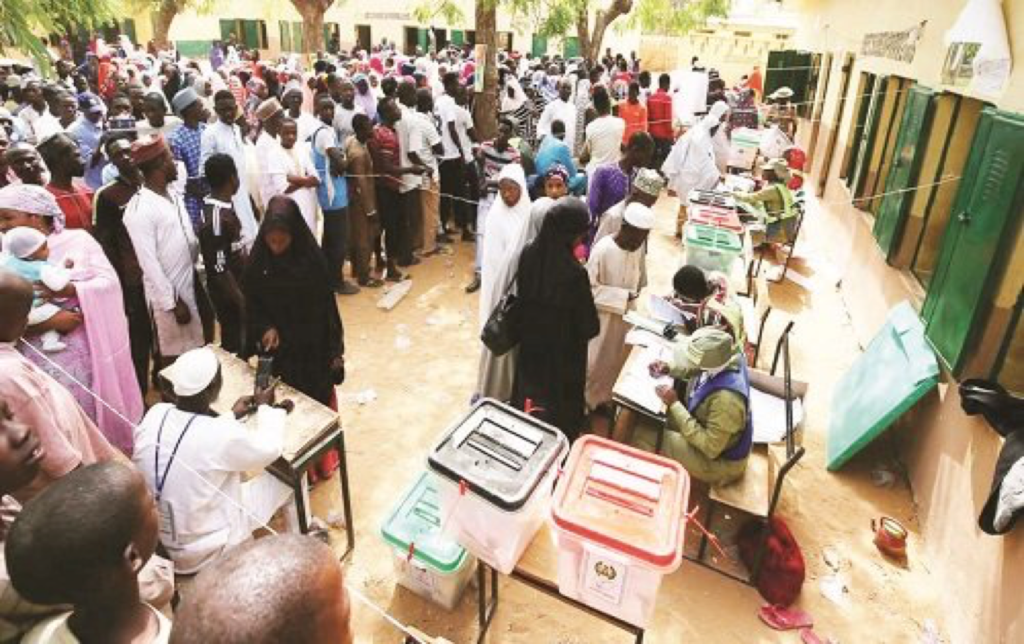
Ahead of the 2023 general elections, Nigeria is chasing shadows, instead of pursuing serious electoral reforms.
While many democracies, even in the backward African continent, are embracing electronic voting, Nigeria, the supposedly giant, is afraid of technology; its merit for improved elections and prospects of safeguarding the sanctity of the ballot box.
Section 52(2) of the Electoral Amendment Act Bill, which deals with the electronic transmission of election results, is a divisive issue.
During the public hearing on the Electoral Act Bill, stakeholders agitated for the deployment of technology. To them, it is the baseline for vote protection. But, the two chambers of the National Assembly failed to uphold the demand for greater electoral sanctity. There was no joint parliamentary consensus or unanimity.
While the House of Representatives appeared disposed to granting the power to employ electronic transmission to the Independent National Electoral Commission (INEC), the Senate was reluctant. A section of the Upper Chamber wanted the electoral agency to seek permission from the National Communications Commission (NCC) and the National Assembly before employing the method in any part of the country.
The anti-electronic transmission lawmakers argued that some parts of the country lacked the required network coverage. In fact, an NCC official, Adeleke Adewolu, said only 50 per cent of the country has the 3G coverage required for transmission.
Does it mean that the lawmakers also have access to a pool of information on the danger of electronic transmission hidden from the public or they are pursuing a hidden agenda as alleged by the opposition?
The voting pattern on the floor of the Senate contradicted public yearnings; 52 voted in favour of the rejection of electronic transmission, 28 voted in its favour and 28 shunned voting.
However, INEC was not swayed by the parliamentary tide. Its National Commissioner for Information and Voter Education, Festus Okoye, said the electoral commission has the capacity to transmit election results electronically from remote areas.
He said:” We have uploaded results from very remote areas, even from areas where you have to use human carriers to access. So, we have made our own position very clear, that we have the capacity and we have the will to deepen the use of technology in the electoral process.”
Clearly, INEC is handicapped. Its hands are tied by the law. Okoye said since the commission is bound to operate within the limit of the law, it cannot exceed the boundary.
The proposed amendment is counter-productive. It places the country at the mercy of federal lawmakers. But, their word is not final. The last hurdle is presidential assent. It does not appear that the final seal will be elusive. But, the country has to prepare for the consequences of the new laws.
The Electoral Act review is very important. It is critical to the survival of electoral democracy. There is a general clamour for the sanctity of the ballot box. Yet, it appears there is a shortage of courage by the National Assembly to take the bull by the horn and confront the challenge.
The majority of the federal lawmakers demonstrated gross insensitivity. The voting pattern on the floor underscored the huge gap between personal interest and public expectations. But, in the final analysis, in whose interest is electoral malpractices?
After the electoral terrorism supervised by INEC in 2003 and 2007, agitations for electoral reforms had intensified. Civil society groups and opposition parties called for electronic voting. The clamour never yielded results.
Subsequent elections have been worse, making stakeholders to renew their demands for electronic transmission. The belief was that votes were usually manipulated between polling stations and designated centres for collation.
Is manual tallying the answer in 21st century Nigeria? Is it not permanently susceptible to gross manipulation? What have previous elections taught the country?
The collation of results is always problematic, chaotic and can be violently disrupted by candidates, party members and thugs. Cases of missing results are associated with the archaic method of a manual transmission, whereby those who win elections at polling booths end up losing at collation centres.
Collation centres are hardly insulated from fraud. The process can be subverted at that level by unscrupulous electoral officers, following financial inducement. Besides, the chances of human errors are reduced. Logistic problems, lack of vehicles and canoes to transport results are averted.
More importantly, electronic transmission has the potentials of reducing errors during the calculation of results. The ease of collation is enhanced. When polls are electronically transmitted from polling booths, candidates and party agents can do their own tallies. Thus, nobody can tamper with poll outcomes at the collation centres.
In these days of e-commerce, e-banking and other technological advancements, e-voting would have been attempted to know its relative advantages. There is the argument that due to the literacy level, it may not be hitch-free.
But, there is no strong argument against electronic transmission of poll results. Therefore, the rejection of electronic transmission of results amounted to the affirmation of business as usual. Rigging at the level of collation may continue. Rejection of electronic transmission is a thoughtless endorsement of rigging, manipulation and all forms of electoral fraud. It is a disservice to democracy.
For Nigeria, electoral reform is an unfinished business.

